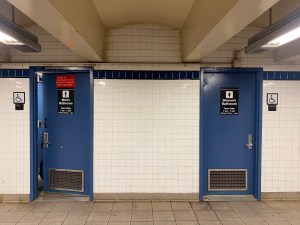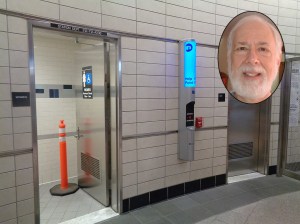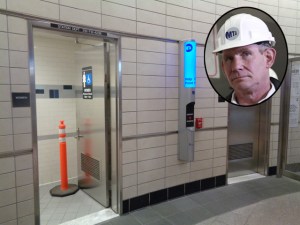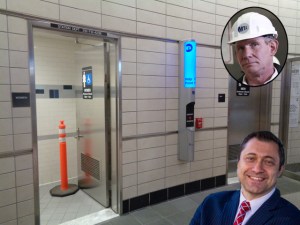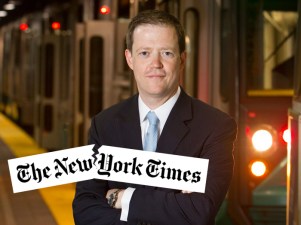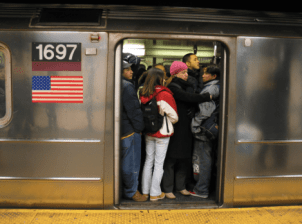EXCLUSIVE: MTA To Start Reopening Subway Bathrooms Early Next Year

Relief is on the way.
Subway station bathrooms will begin reopening early in 2023 as the Metropolitan Transportation Authority reverses its pandemic-era decision to shutter toilets for nearly three years, Streetsblog has learned.
Beginning in January, the underground facilities will reopen at eight stations, including these five (the other three are still to be determined):
- 161st Street-Yankee Stadium (B/D/4)
- 14th Street-Union Square (L/N/Q/R/W/4/5/6)
- Jay Street-MetroTech (A/C/F)
- Flushing-Main Street (7)
- Fulton Street (A/C/J/R/Z/2/3/4/5)
The agency will phase in additional stations after that, thanks to the hiring of 800 cleaners over the past two months, according to New York City Transit President Richard Davey.
“The lack of public bathrooms generally in New York City has been a question that folks have asked about and we hope to do our part,” Davey told Streetsblog. “We are absolutely completely obsessed and focused on customer satisfaction and obviously this will be another amenity that our customers will be able to avail themselves.”
Transit leaders shut down the 133 public restrooms across 69 stations at the start of the Covid-19 outbreak in March 2020. The dearth of public toilets has long been a scourge of the Big Apple, but losing bathrooms in the subways was particularly challenging for the homeless, who were left with few other options.
About a year ago, the MTA unlocked the station restrooms at its commuter rail hubs, including at Penn Station, Atlantic Terminal, and Jamaica on the Long Island Rail Road, and at Grand Central Terminal on the Metro-North Railroad.
But transit leaders stalled the return of the subway loos due to concerns about vandalism, illegal drug use, and unhoused people setting up shop inside. MTA reps also said they didn’t have the staff to take care of the facilities as they contracted out workers were for the multi-million-dollar pandemic effort to disinfect train cars daily.
The new maintenance staff will be unionized under an agreement with labor leaders, Davey said.
The agency also started hiring more private security last month targeting fare evasion, and they will also be there to keep tabs on the toilets.
“They could be available for example if a customer went into a bathroom and saw something that was inappropriate, that the security officer could get NYPD or otherwise assist the customer,” Davey said.
Advocates and pols have been pushing the agency to unlock the bathrooms for more than a year, as other public restrooms in city parks and libraries have allowed people back in, and as the city and state dropped most of their remaining Covid protocols.
The MTA has also had to take an increasing number of subways out of service due to a surge in soiled train cars over the last two years.
Weekday subway ridership has also returned to more than 60 percent of its pre-Covid numbers for most of this year, and inched closer to four million trips a day than during the entire health crisis last week.
One state lawmaker lauded the transit bigs for the bathroom revival.
“I appreciate the MTA for acknowledging this very basic human need,” said state Sen. Jessica Ramos (D–Queens), who earlier this year grilled MTA Chairman Janno Lieber about the closed toilets at an Albany hearing. “It never made any sense to me that there were closed bathrooms or no bathrooms available in the subway.”
Lieber countered at the time that the subway bathrooms were not a priority for the MTA, saying it was not the agency’s job to offer the city’s unhoused a place to go, adding, “We are a transportation agency.”
NYCT officials were focused on hiring more subway and bus operators and conductors before filling maintenance positions, said Davey. (Gov. Hochul and Mayor Adams also have been focused on cops, announcing on Saturday a new safety push called, “Cops, Cameras and Care” that consists of an additional 1,200 overtime police shifts per day.)
A handful of bathrooms will also require more extensive repairs, the transit boss said, adding that it was too soon to say when all 133 stalls and urinals would be back online.
“We want to see how this goes, but the ideal would be to open all the restrooms at some point,” Davey said.
A homeless advocate called on the MTA to hurry up with its potty plan.
“Every day that goes by without access to these facilities is another day that people are forced to sacrifice their dignity or risk their health,” said Jacquelyn Simone, policy director at the Coalition for the Homeless, who added that even getting back to pre-pandemic levels of bathrooms was not enough.
“Just getting us back to the pre-pandemic status quo is not enough and we need to think holistically that there is access to public bathrooms for all New Yorkers throughout the city,” Simone said.
